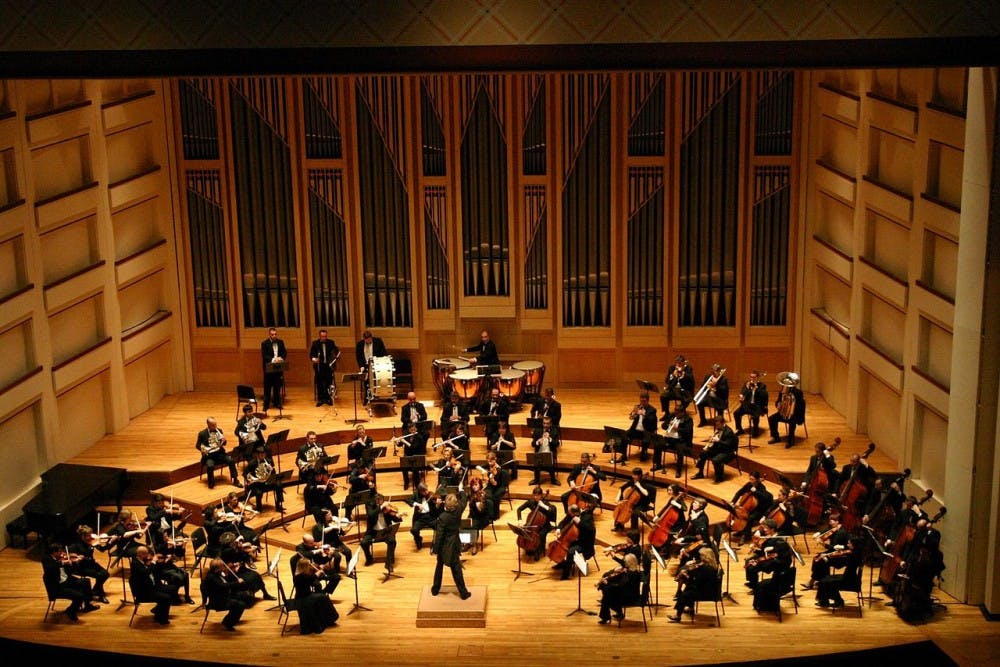By Alison Perelman, Assistant Culture Editor
The hallways in the basement of Presser Hall start to buzz with activity -- students in conversation, weaving in between the growing crowd and getting instruments out of the lockers.
A few are already inside room seven. The percussion players set up their drums and cymbals. The harpist plucks at the strings, adjusting the knobs for tuning. Others blow notes to tune or play up and down a scale.
In the middle of this slight chaos, Ricardo Palmezano practices a section of his piece, his violin's slow, melodic tune rising above the random notes.
Palmezano is a graduate student, returning after six years of playing in professional orchestras in Brazil.
"Here we are like a big family, a symphony orchestra where you need to talk with the strings, but you also need to talk with the woodwinds, so the various families that are in the orchestra," Palmezano said. "And it has been a privilege to be here and play with them."
The room is almost full now with strings in front, then the woodwinds, then brass and percussion in the back. Sound, but not yet music, is everywhere.
A minute before class is to start, Ricardo Averbach stands on his conductor's podium, and the room grows silent.
This was the symphony orchestra's last rehearsal, with only the dress rehearsal left before their concert.
While the symphony orchestra is considered an organization, it is also a class that meets twice a week. This means limited rehearsal time, especially with students coming from other classes across campus.
And this isn't the only obstacle. About 40 percent of the 70 or so members of the orchestra are non-majors. This means that Averbach must find a balance between students who are involved as a hobby and graduate students on the path to becoming professional musicians.
"So this is, I think to me, is the greatest challenge, to create an environment that is challenging for everybody and still possible," Averbach said. "Because if it is too easy for the advanced students, they'll be frustrated. If it is too difficult for the non-majors, they not only will be frustrated; they will quit."
Enjoy what you're reading?
Signup for our newsletter
Unlike their first concert, which focused on traditional pieces like those composed by Beethoven, this concert includes more contemporary orchestral songs.
"What I try to do here with the students, something that is one of my priorities, is for them to get the maximum possible number of experiences," Averbach said. "And by that I mean, play music from very different eras so that they learn the different styles."
This concert is more romantic, with music that was made to be related to a story, such as "Scheherazade," which is based on "One Thousand and One Nights."
Another piece being played is "Chimera," which has never been performed in the U.S. before.
"It's a really interesting piece," senior Ashley Overby said. "Sometimes modern music is a little grating on the ears, I have to admit, but it's actually kind of beautiful. There are some really beautiful moments, and I think it tells a really great story."
Even more, the piece's composer, Anthony DiLorenzo, will be a guest at the concert, along with Samuel Adler -- one of the most prominent living composers.
"It's something very special when you have a famous composer coming and you perform his music," Averbach said. "Now even more is when you have two composers."
Palmezano plays the violin solo of "Scheherazade" -- a difficult task, especially with the composer present. But he also recognizes the privilege of having the composer there to give insight.
"Chimera" is a concerto with a brass quintet -- an unusual composition. The quintet will be played by five members from the Cincinnati Symphony Orchestra, three of whom are also Miami faculty.
Though they are professionals and play all the time, the faculty members are just as excited to perform the concert. Associate professor Jaime Morales-Matos enjoys getting to play along with the students.
"I love it because you can see the improvement -- how they go from the first rehearsal to the concert, how they prepare, how they improve, how they grow -- musically and technically," Morales-Matos said.
The students enjoy it, too. They get the opportunity and experience of playing next to professionals.
"I'm pretty excited about it," Overby said. "They're great musicians, and it's going to be a great opportunity to work with them."
The symphony orchestra's concert will be held at 7:30 p.m. on Monday, Nov. 21, in Hall Auditorium with Samuel Adler giving a pre-concert talk at 7 p.m.




